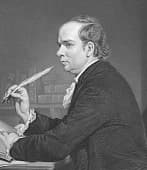Oliver Goldsmith
Critique

Born
1730
Died
1774
Publications
Novels, plays
Writing language
English
Literature
• The Vicar of Wakefield (1766)
• She Stoops to Conquer (1773)
Novels
• The Vicar of Wakefield (1766)
Plays
• She Stoops to Conquer (1773)
British Literature
• The Vicar of Wakefield (1766)
• She Stoops to Conquer (1773)
Ascendance of the inspired idiot
Why Oliver Goldsmith is considered one of the greats of English literature is a mystery. His two "masterpieces", The Vicar of Wakefield and She Stoops to Conquer, are mildly entertaining but ephemeral. They practically evaporate on second readings.
Moreover, one gets the idea that Goldsmith was somewhat of an intellectual lightweight. He had a facility for knocking out plots and characters that would divert an audience for short periods of time. Today he'd be a television sitcom writer.
Perhaps two or three of his works are rated so highly because of their historical impact—because they helped kill off the stuffy, sentimental trend in literature that reigned during the mid-eighteenth century. He may be credited for helping make the way for greater writers to come along and create genuine masterpieces that could appeal to common folks.
Goldsmith was born and raised in Ireland. After he graduated from Trinity College, Dublin, in 1749, his misadventures as a young man included attempting to emigrate to America (which failed when he missed the boat), gambling away the money that was to enrol him in law studies at Dublin, dropping medical studies at Edinburgh after a year and a half of non-attendance (although he later claimed to have a medical degree), and playing the flute to pay his way on a walking tour of Europe.
Actually, those are all happenstances that might endear him to me. It's his writing that turns me off.
In 1756 he landed in England, broke. There he turned to churning out hack journalism, translations and children's books. One of his more substantial works of this period is the booklet Enquiry into the State of Polite Learning in Europe, his first work to drop the traditional British stiffness of style. It was well received. Also noteworthy is his essay The Citizen of the World, which gained him some fame as a literary critic, although some of his prose here seems "borrowed" from other writers.
His long poem The Traveller (1764) was also popular in his day, going through nine editions in ten years.
Sentimental favourite
So Goldsmith had by this time achieved a little success as a poet, critic and essayist, and he belonged to Samuel Johnson's circle of literary lights. But his dissolute lifestyle continually led him to the brink of financial disaster. The story goes that Johnson once found him unable to pay his rent, being threatened with eviction. To get him out of difficulties, the good doctor immediately sold Goldsmith's manuscript of an unpublished novel to a bookseller for sixty pounds.
In this way The Vicar of Wakefield (1766) found its public, according to this possibly fanciful account. The novel which gently satirizes a good man taken advantage of by scoundrels was popular in its time and has remained a sentimental favourite ever since.
Having had hits in poetry and prose, Goldsmith turned next to drama. His first attempt was the comedy The Good Natured Man (1768). Its low style, which purposely affronted the genteel sensibilities of English theatre audiences, was only a middling success on stage, but it became popular with the reading public in print.
He switched back to poetry with The Deserted Village (1770), but his biggest success then came with the play She Stoops to Conquer (1773). He had great obstacles in getting it produced, given his mission of replacing the decorous, sentimental comedy fashionable at the time with laugh-out-loud comedy in the vernacular. However, She Stoops to Conquer turned out to be a massive hit and has been a standard part of the theatrical repertoire ever since.
You'd think these successes would set Goldsmith up for life as a literary figure, and he would continue producing important works. Instead he returned to nonfictional hack work, mainly superficial histories, to meet his continual need for cash. But his drinking, gambling and erratic ways always returned him to debt, the state in which he soon died, likely as a result of trying to treat an illness with a dose from his own prescription.
The man of letters Horace Walpole described Goldsmith as an "inspired idiot" and it's hard to dispute this. His life and death would certainly support the latter part of this claim. Yet his ability to produce works in all literary forms, gaining public acclaim despite going against the established tradition of fine writing at the time, certainly justifies the "inspired" label. This achievement is not to be denied and may win for Goldsmith credit as an innovator who changed literary history for the better.
But whether his works deserve to stand with the greatest of all time is another question.
Without giving them extra marks for knowing what they were up against, my estimation is they should be considered good but rather forgettable creations.
Which is, of course, refuted if numerous readers now write me to say they do remember and appreciate his writing. Someone seems to be keeping his work alive.
— Eric
Critique

